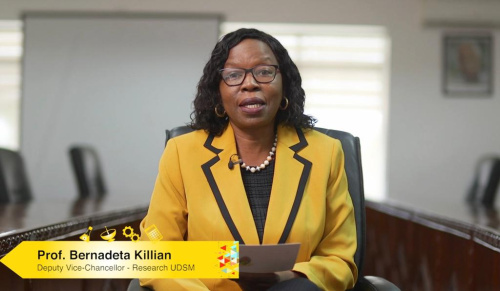Prof Killian appointed to UNESCO's International Bioethics Committee
By Dotto Kuhenga, Communication and Information Office,
The University of Dar es Salaam Deputy Vice Chancellor-Research, Professor Bernadeta Killian has been appointed a member of the UNESCO's International Bioethics Committee (IBC), for a period of four years, from 2022 to 2025.
The appointment that was communicated to Prof. Killian, a Political Science and Public Administration don, in a letter from the UNESCO Director-General, Audrey Azoulay, indicates that the DVC-Research would effectively assume the position from 30 June, 2022.
In the communication, the Director-General states that IBC “would be delighted to be able to count on your (Prof. Killian) expertise”. The IBC is the only advisory body within the United Nations System to engage in transdisciplinary and multicultural debate on ethical issues in the life sciences field and its applications in order to ensure respect for human dignity and freedom.
According to the UNESCO Social and Human Sciences Sector information, the IBC, which was established in 1993, is a body of 36 independent experts appointed by the UNESCO Director-General in their personal capacities based on cultural diversity, balanced geographical representation, gender balance and proposals from States of qualified specialists in the life sciences and in the social and human sciences.
The IBC, which provides the only global forum for in-depth reflection in bioethics, together with another Intergovernmental Bioethics Committee (IGBC), are presently contributing to the promotion and dissemination of the Universal Declaration on Bioethics and Human Rights by elaborating the reflection on the principles set forth therein.
Prof. Killian is an Associate Professor of Political Science and Public Administration in the College of Social Sciences. She holds a PhD and a Masters in Political Science, both from the University of California Los Angeles (UCLA); and a Masters in International Relations and Bachelor of Education from the University of Dar es Salaam.
Prof. Killian, who says she is “very excited about this appointment towards making a contribution to ethics and humanity”, has held various leadership positions, locally and internationally. She has also received various academic awards, and published and provided consultancy extensively in the areas of policy analysis, gender equality, development cooperation, elections and democracy, and legislative politics and governance.
The Director-General of UNESCO convenes IBC at least once a year; and, through its sessions and working groups, the Committee produces reports, advices and recommendations on specific issues that are widely disseminated and submitted to the Director-General for transmission to Member States, the Executive Board and the General Conference.
Other News
Sun, 10.Nov.2024 : UDSM na UH vyafanikisha upatikanaji wa Kamusi ya Kihispania-KiswahiliFri, 08.Nov.2024 : UDASA Bonanza 2024 picks up vibes
Fri, 01.Nov.2024 : Robotics Bootcamp attracts hundreds of young talents to UDSM, sparks passion for Physics and Technology
Wed, 30.Oct.2024 : Dr. Jackson Justo drives AI-powered energy innovations for sustainable future
Thu, 24.Oct.2024 : Partnership with NMB promises innovation, talent development and digital transformation at UDSM
Wed, 09.Oct.2024 : Economics don Dr. Innocensia John is named among 2024 top Agri-Food Pioneers
Tue, 08.Oct.2024 : School of Mines and Geosciences gears up for Helium exploration in Tanzania
Sat, 05.Oct.2024 : UDSM students excel in 2024 NGEA Award Regional Challenge


